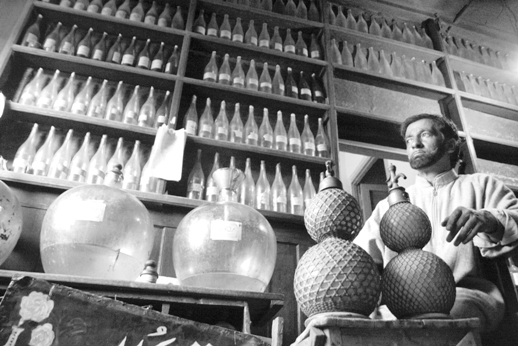Abdul Aziz Kozgar inherited the craft of making rosewater manually, but is unlikely to pass it on to the next generation. Shazia Yousuf talks to the only surviving rosewater man.

Inside, the shop is dark. Mild aroma of rose petals hangs in the air. Centuries old empty glass jars rest on wooden shelves. In dim light, they shimmer like waters under sunset. Sitting silent in the busy market of Fateh Kadal, this shop grabs the attention of every passerby but hardly attracts any customers. The aroma of roses is mixed with the melancholy of its owner Aziz Ahmad Kozgar, who is witnessing death of a craft. Aziz doesn’t run it for money any more. His only desire is to maintain a legacy.
Some 400 years ago, Kozgar’s forefathers came from Turkey and settled in Kashmir. They knew the craft of making rose water and other syrups manually. In Fateh Kadal, they set up their own shop. This 48-year-old graduate, also a government employee, is now the only person with this skill.
Besides mornings, evenings and holidays, Aziz takes leave from office for making rose water on Urses (anniversaries of saints). The family, he learned from his father, had come along with the son of Mir Syed Ali Hamdani. “That is why our shop was set up outside the main gate of Khankahi Moalla. Our house too was built nearby,” says Aziz. Since then the family has the tradition of making rose water and spraying it inside shrines on different anniversaries.
Not many have come to Aziz for learning this craft. The ones who approached him later set up their mechanical units, doing away with the manual practices. But Aziz never agreed on increasing production on scientific and technological basis. “That would have killed its historical significance,” he asserts.
Aziz recalls his childhood when his whole family would take part in making rosewater and other syrups. Over the last twenty years, however, the demand has drastically declined and Aziz is able to manage the production single handedly. “Those days we would have heaps of rose petals in our courtyard. Everyone in the family, even women, would know the preparation of syrups.
Now it is only me with my sense of duty left,” says a nostalgic Aziz. In Aziz’s childhood, the family had dozens of antique jars. Over the years, harsh winters consumed them as the glass developed cracks. Aziz is left with few of them. “I don’t use them now. I have put them on display so that people come to know about such things,” he says. Though the bottles do not mention any brand names or manufacturing companies, Aziz says that these are made in Germany. “My father would say so,” he confides.
Aziz’s father would prepare more than 50 syrups besides rose water. He says that the products are no more in demand. “I prepare only few syrups like tshandan arq, kaah zabaan and arqi neelofar. These are quick remedies for body heat and are very good for stomach and kidneys,” says Aziz while filling a disposable bottle with rose water for a customer from Nishat. The customer terms Aziz’s products cheap and best. He leaves with a warm smile. Abdul Waheed, Aziz’s younger brother who assists him in making syrups is an allopathic doctor by profession. Besides a maker, he is a consumer too. “I take both types. Whenever I use antibiotics, I prepare and drink syrup that has a cooling effect on my stomach,” Waheed says.
Although these herbal syrups are free of side effects, yet hardly anyone makes uses them these days. Aziz believes that in present times, where life is on a fast track, herbal medicine have no place as they take time to cure an ailment. “For a mild fever in my childhood, I would be kept on fast at least for a week. Such a treatment is not applicable in today’s time when a child cannot afford to miss a single day at his school,” he says.
On one of the walls of the shops hangs a photograph of sufi saint, Syed Meerakh Shah. “My father has kept it there,” Aziz says while gazing at the photograph. “In my childhood, this saint would come here and ask for rose water,” he adds. Aziz believes that this profession has some spirituality attached to it. He says many fakirs come to his shop for drinking rose water.
Aziz, who as a child would assist his father Habibullah Kozgar, has a 17-year-old son who is yet to know the basics of this craft. Aziz doesn’t want to push him into the trade. “In my time, there was a lot of money in it. How can I compel my son to go into a trade that has got no future for him? He is good at studies,” he says. “This art for sure is going to die, but my eyes can’t see it dying. That is why I run this business,” Aziz adds.
Inside the shop, a clock hangs from one of the walls. The pendulum of the clock suspends motionless. The hour hand sits on digit five, the minute hand hasn’t fully made it to six. Like the hands of the clock, the craft is unlikely to make it to the next stop.















